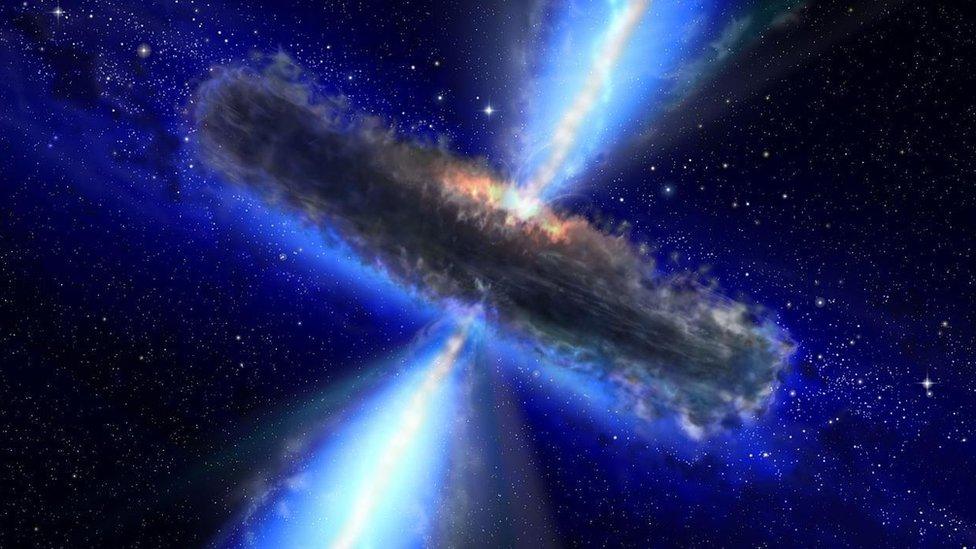First supermassive black hole to be photographed is spinning
- Published
- comments

This is an artist's image of a black hole
Experts say they have found proof for the first time that black holes spin.
The supermassive black hole is at the centre the Messier 87 (M87) galaxy which is 55 million light years from Earth and is positioned next to our own Milky Way galaxy.
It was the first supermassive black hole to be photographed by the Event Horizon Telescope in 2019.
Scientists say the findings could reveal how supermassive black holes found at the centre of galaxies are formed.
What is a supermassive black hole?
Every large galaxy has a supermassive black hole at its centre and unsurprisingly, given their name, they are properly big.
Supermassive black holes are so gigantic they have a mass of more than one million stars the size of our own Sun.
Mass is how much stuff something is made out of and black holes have LOTS of stuff in them, all tightly packed together.
Dust and gas that is jetted outwards from a black hole has to be ejected at the speed of light to escape its gravitational pull
Just beyond the black hole is a disk of swirling dust and gas flowing into the black hole's centre, disappearing we think forever.
As the ingredients of swirling dust, energy and gas flow into the black hole it becomes very, very hot, and very, very bright.
Some of that material then gets pushed out from the middle of the black hole, creating a jet of light.
For a long time scientists thought the black hole's spin was responsible for this phenomenon.
They believe the disk of dust and gas around the black hole produces a powerful magnetic field and as the black hole spins, it drags the field with it.
The field of dust and gas is then wound up like a funnel, creating the bright jets seen pushed out from the black hole's centre.
Black holes are pretty epic. They're formed when a dying star collapses inward under the pressure of its own weight. This leads to something called a supernova, a star's extremely powerful explosion.
Black holes are places in space where the pull of gravity is so strong that even light can't escape it! This is what makes them invisible.
The Messier 87 black hole
The first ever photo of a black hole from the M87 galaxy.
The fact supermassive black holes eat everything around them, including light, makes them very difficult to study.
The black hole at the centre of Messier 87 (M87) was the first to be photographed.
The image taken by the the Event Horizon Telescope (EHT) in 2019 showed the black hole with a bright, hot jet stream of particles that stretch for 5,000 light years - that's larger than the size of our entire Solar System.
The image has now helped to confirm scientific theories the supermassive black hole is spinning.
'Monster black hole is indeed spinning'
An artistic impression of a black hole like the one found at the centre of the M87 galaxy
Despite the first image of the black hole being taken in 2019, scientists have been able to analyse it for much longer, thanks to the vast amounts of light and energy it has ejected into space.
Since the year 2000 a global network of radio telescopes have been able to observe M87.
These observations have led scientists to discover the black hole's bright jet is wobbling - a little bit like a toy spinning top.
"Whether this black hole is spinning or not has been a central concern among scientists," said Dr Kazuhiro Hada, from the national astronomical observatory of Japan.
"Now anticipation has turned into certainty. This monster black hole is indeed spinning," he said.
How does a black hole 'burp'?
- Published11 April 2019
- Published26 August 2022
- Published20 April 2022
